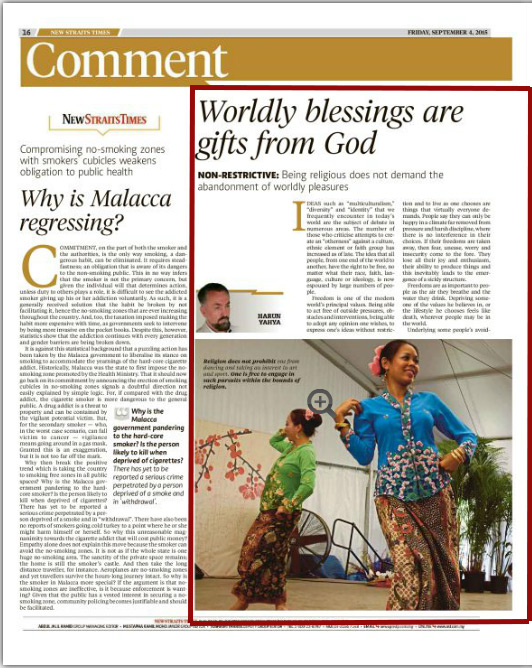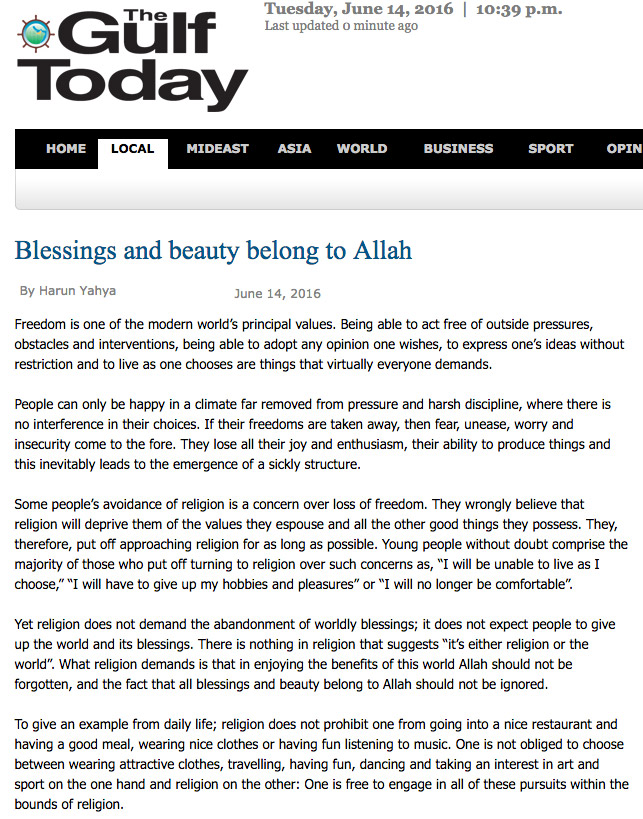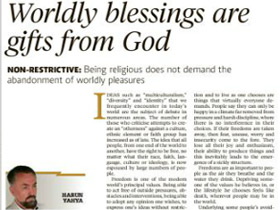
IDEAS such as “multiculturalism,” “diversity” and “identity” that we frequently encounter in today’s world are the subject of debate in numerous areas. The number of those who criticise attempts to create an “otherness” against a culture, ethnic element or faith group has increased as of late. The idea that all people, from one end of the world to another, have the right to be free, no matter what their race, faith, language, culture or ideology, is now espoused by large numbers of people.
Freedom is one of the modern world’s principal values. Being able to act free of outside pressures, obstacles and interventions, being able to adopt any opinion one wishes, to express one’s ideas without restriction and to live as one chooses are things that virtually everyone demands. People say they can only be happy in a climate far removed from pressure and harsh discipline, where there is no interference in their choices. If their freedoms are taken away, then fear, unease, worry and insecurity come to the fore. They lose all their joy and enthusiasm, their ability to produce things and this inevitably leads to the emergence of a sickly structure.
Freedoms are as important to people as the air they breathe and the water they drink. Depriving someone of the values he believes in, or the lifestyle he chooses feels like death, wherever people may be in the world.
Underlying some people’s avoidance of religion is a concern over loss of freedom. They imagine that religion will deprive them of the values they espouse and all the other good things they possess. They, therefore, put off approaching religion for as long as possible.
The erroneous idea that religion is the opposite of social life is quite widespread. Young people without doubt comprise the majority of those who put off turning to religion over such concerns as, “I will be unable to live as I choose,” “I will have to give up my hobbies and pleasures” or “I will no longer be comfortable”.
The idea of religion held by many young people, who think that they will have to forego many pleasures and customs if they exhibit a tendency toward religion, is one of a lifestyle involving pain, suffering, unhappiness, trouble and pessimism. They regard it as much better to stay away from religion until they get old, when they will have to withdraw from social life; on one side of the scales they put all their joy and happiness, art, beauty, dance and having fun, everything they regard as good, while on the other side, they put everything they imagine is demanded by religion; the prohibition of fun and laughter, music, sport and dressing well, with a dark and introverted lifestyle devoid of any art or beauty in its place. Of course their souls prefer the good things, and since they put these on the “worldly” side of the scales, they thoughtlessly turn their backs on religion.
Yet religion does not demand the abandonment of worldly blessings; it does not expect people to give up the world and its blessings. There is no idea in religion of “Either religion or the world”. What religion demands is that in enjoying the benefits of this world God should not be forgotten, and the fact that all blessings and beauty belong to God should not be ignored.
To give an example from daily life; religion does not prohibit one from going into a nice restaurant and having a good meal, wearing nice clothes or having fun listening to music. One is not obliged to choose between wearing attractive clothes, travelling, having fun, dancing and taking an interest in art and sport on the one hand and religion on the other: One is free to engage in all of these pursuits within the bounds of religion. One can be as well-groomed and well-dressed as one wishes. One can wear nice clothes and accessories, use pleasant perfumes and carry on with one’s hobbies. Religion does not prohibit such things. Indeed, it encourages people to look as good and fine as they can.
In short, religion does not prohibit blessings. What it does prohibit is ingratitude, disloyalty or lovelessness toward God, to Whom all blessings belong. While fully enjoying the blessings of this world, one must not forget that they all belong to God and that all good things are bestowed on one by Him. That is all one has to do.
It must not be forgotten that it is God Who creates the blessings of this world as pleasant and creates love for them in people’s hearts. God does not prohibit bright city life, decorative shop windows, LED-screen advertising billboards, cafes, restaurants, cars, yachts, fine houses and gardens or the latest fashions in clothes, nor does He prohibit the enjoyment thereof because it is He Who creates them.
These things are manifestations of His love for us, His servants. What we must do in return is to express our love of our Lord, the Creator of all such good things and the universe, through thanks, worship, prayer and moral virtue.
The fact is that the world and religion are not two distinct concepts. Religion was created together with life. Moreover, religion is life; it pervades every area, moment and detail of life. Not only is there no sense in keeping religion and the world separate and putting religion off as long as possible, there is also no validity in such an idea. Everything that makes life is in religion, such as modernity, beauty, joy, happiness, inter-communal peace, brotherhood and friendship. Therefore, someone who lives by religion is someone who fully engages in what life demands.
Adnan Oktar's piece on New Straits Times & The Gulf Today:



